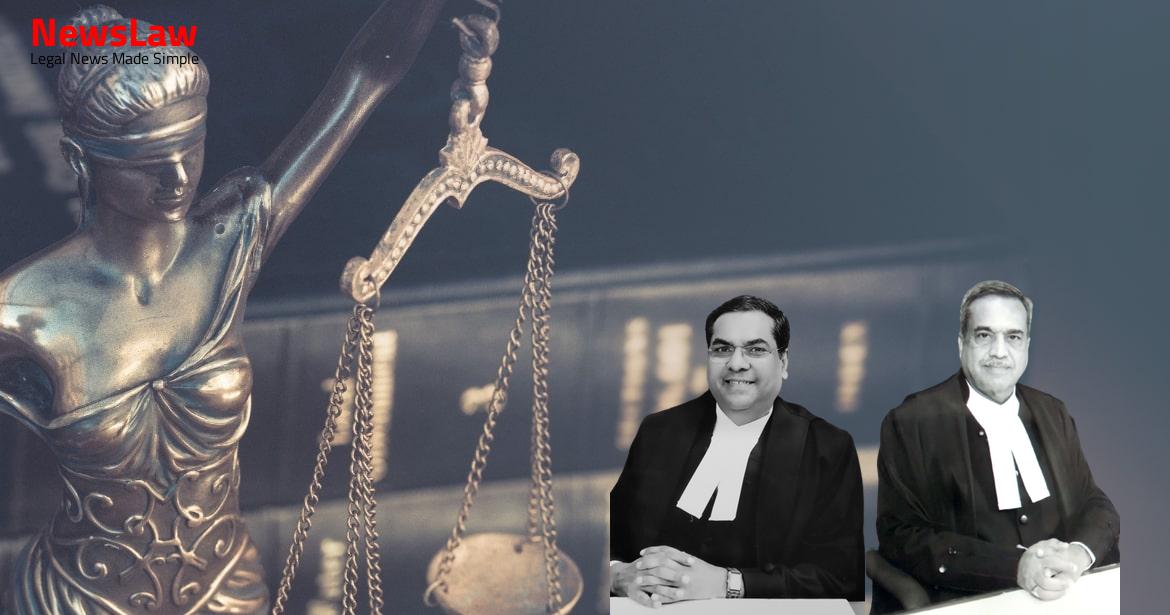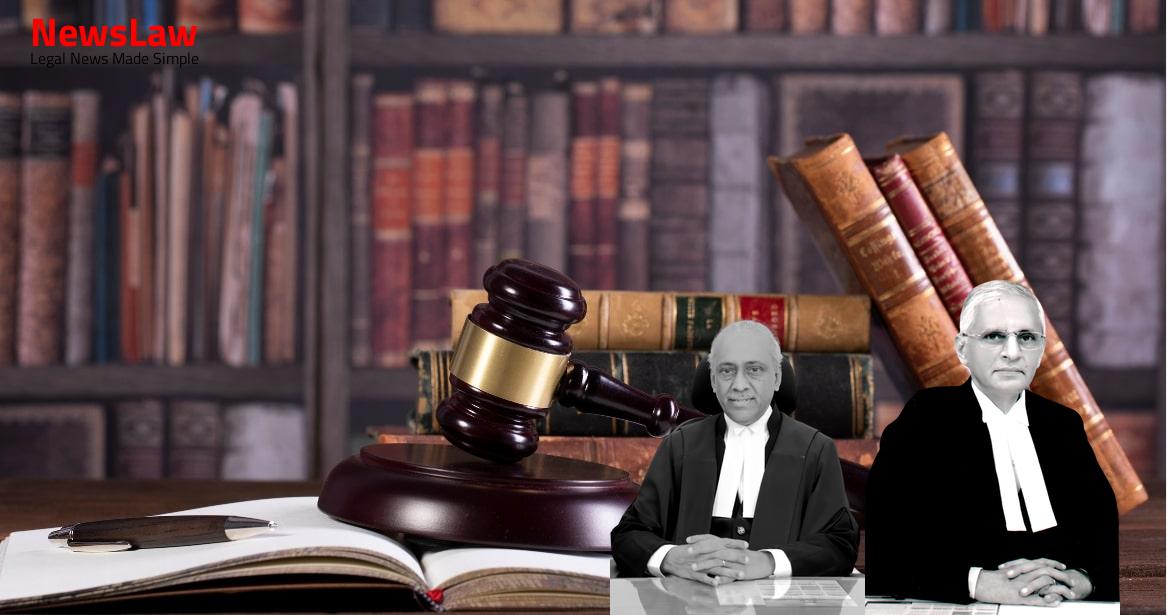In a significant legal ruling by the Supreme Court of India, the case of acquittal reversal in an appeal involving offences under Sections 217 IPC and 221 IPC has been addressed. The judgement brings clarity to the appellant’s position in the case, ensuring justice is upheld. Stay informed about this crucial legal development. #SupremeCourt #LegalCase #JusticeServed
Facts
- The High Court referred to the report of PW-77, Senior Scientific Officer of CFSL, which showed that the photos and videos were not doctored.
- The trial court erred in brushing aside the video footage and photos contained in the Compact Discs on presumptuous grounds that they could have been doctored, a perspective deemed as perverse by the High Court.
- The High Court held that from the photographs and video footage, it was evident that the appellant was seen going along with accused No.1 and did not take action to prevent the crime or apprehend the criminals.
- The High Court reversed the acquittal of the appellant-accused No.17 based on the evidence presented, including M.O.45-CD, photographs, and other material objects.
- The trial court’s dismissal of the evidence presented against the appellant was deemed insufficient by the High Court, leading to the reversal of acquittal and subsequent conviction and sentencing.
- PW-75 handed over M.O.45-CD to the Investigating Officer as per request
- Newspaper Dinakaran published public opinion favorable to M.K. Stalin
- Incident at Dinakaran office on 09.05.2007 involved vandalism and fire
- Accused No.17 charged under Sections 217 IPC and 221 IPC
- Multiple accused charged for various offenses including damage to property and violence
- Seventeen accused persons charged in total, with different roles specified
- Protests staged against Dinakaran newspaper by supporters of M.K. Alagiri
- CBI investigation initiated after FIR registration at Othakadai Police Station
- Demonstrations, arson, and loss of lives reported during the incident
- Deceased persons identified and post-mortem conducted
- Disagreement over admissibility of electronic evidence M.O.45-CD and Compact Discs
- Issues raised regarding compliance with Section 65-B of the Indian Evidence Act for electronic evidence
- Response from learned Senior counsel and objections raised concerning electronic evidence
- Points from prior legal cases referenced to support arguments regarding electronic evidence
- Evidence from Senior Scientific Officer of CFSL supporting the originality of photographs and videographs
- Tampering with evidence ruled out by the Senior Scientific Officer
- Transfer of case investigation to CBI under special police establishment act
- Challenges to the admissibility of electronic evidence and the process followed
- Charges specified against accused Nos.1 to 16 for various offenses related to the incident
- Eyewitness accounts and news coverage detailed in the case
- Timeline of events presented through witness testimonies and investigative actions
Also Read: High Court Acquittal Case of State of Uttar Pradesh v. Jai Prakash
Arguments
- Learned Senior counsel for the appellant argued that the High Court erred in not considering the role of Senior Police Officers in regulating police bandobust and giving directions, which would absolve the appellant from liability.
- It was contended that the High Court should not have relied on Compact Discs without the required certification under Section 65-B of the Indian Evidence Act.
- The appellant’s counsel argued that the High Court improperly reversed the acquittal order without sufficient grounds, stating that interference with acquittal orders should only occur in case of erroneous evidence appreciation or perversity in the trial court’s judgment.
- The High Court has the power to review the entire evidence in an appeal against acquittal
- Paramount consideration is to prevent the miscarriage of justice
- The High Court reversed the acquittal and convicted the appellant for offences under Sections 217 IPC and 221 IPC
- Allegation against the appellant, a Deputy Superintendent of Police, was that he did not issue orders to prevent the incident and intentionally omitted to apprehend the miscreants despite their presence
- Appellant had a team of thirty-nine police personnel with arms and accessories at the spot but did not take effective steps to prevent the crime
Also Read: Judgment Review: Supreme Court’s Ruling on the Capital Punishment Appeal
Analysis
- No evidence to prove appellant disobeyed orders of the Officer In-charge of the bandobust.
- Appellant did not intentionally omit to apprehend the accused on the spot.
- Trial court acquitted the appellant based on the lack of evidence for Sections 217 and 221 IPC.
- PW-2 denied handing over Compact Discs to the Investigating Officer.
- Prosecution did not prove appellant’s guilt; conviction cannot be sustained.
- High Court substituted trial court’s findings on Sections 217 and 221 IPC, which was not permissible.
- Appellant was present at the occurrence but did not apprehend the accused.
- Police, including the appellant, chased agitators and used force as testified by witnesses.
- Appellant promptly responded to requests for action from Dinakaran office personnel.
- PW-30 was In-charge of the security bandobust as per evidence.
- Appellant followed orders relayed through wireless communication to the Superintendent of Police.
- Permission from higher authority was required for leaving the assigned duty, no evidence of disobedience.
- Conviction under Section 221 IPC required intentional omission to apprehend offenders, which was not proved.
- Appellant arrested the accused after the occurrence as directed by higher officers.
- Evidence shows appellant took action and used force to prevent further incidents.
- The appellant’s conviction has been set aside and he is acquitted of the charges under Section 217 IPC and 221 IPC.
- The appellant was not involved in the main occurrence and is at liberty to seek remedies in accordance with the law.
- The appellant’s pension and other retiral benefits have been withheld due to the criminal case.
- The High Court erred in reversing the trial court’s order of acquittal for the appellant.
- The charge against the appellant was different and distinct from the charges faced by other accused individuals.
Also Read: The Ruias v. MHL: Landmark Supreme Court Judgement
Decision
- The impugned judgment and order dated 21.03.2019 and 25.03.2019 convicting the appellant-accused No.17 under Sections 217 IPC and 221 IPC are set aside.
- The appeals are allowed and the appellant is acquitted of the charges.
- The concerned authorities are directed to take note of the acquittal of the appellant.
- The appeals of the other accused will be considered on their own merits separately.
- The findings in the present appeals will not impact the appeals of the other accused who have been convicted under Section 302 IPC and other offences, pending before the Supreme Court.
Case Title: V. RAJARAM Vs. STATE REPRESENTED BY THE INSPECTOR OF POLICE CBI/SCB
Case Number: Crl.A. No.-001765-001766 / 2019



